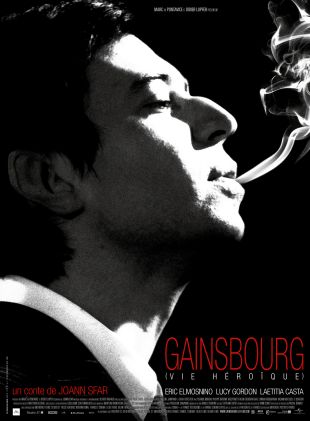
A movie that embraces cheekiness, irony, and even wacky surrealism would seem like a fitting tribute to the French rock star, songwriter, and all-around provocateur Serge Gainsbourg, and that's just what Gainsbourg: A Heroic Life delivers. Based on director Joann Sfar's own graphic novel, the film tells Gainsbourg's story, from a childhood spent enduring piano lessons and fleeing Nazis as a Jew in late-'30s Paris to his latter-day career exploring reggae and alcoholism in late-'70s Jamaica. All the while, the hero is followed by an animated/costumed/puppetted caricature of himself that he calls "his Mug." Inspired partly by his own face and partly by the anti-Jewish propaganda that the young Gainsbourg sees plastered all over the street, his Mug eventually grows with him and becomes an overly tall exaggeration of his own prominent physical features, with a nose like a toucan's beak and fingers like ten slender church spires. Constantly showing up to plant mischievous worms in the artist's ear, Gainsbourg's Mug is the devil on his shoulder, concurrently representing his insecurities and shame as well as the unrelenting source of manic inspiration that genius artists often can't turn off.
If you feel that the idea of an 8-foot-tall character that only the hero can see makes the film sound like Sesame Street on acid, you're not far off. Gainsbourg himself was a master of interweaving silliness and seriousness, artfulness and vulgarity -- never winking at the audience to acknowledge the disparity or letting you know when the earnestness stops and the parody begins. Likewise, the movie often purposefully diverges away from a literal narrative via a musical sequence or a scene too fantastical to be rooted in reality. But these moments are never marked with a beginning or ending point; they flow in and out of the story without warning or explanation, so that much like listening to Gainsbourg's music, you're constantly forced to ask yourself, "Is this part serious or tongue-in-cheek? Is this part real or fantasy?"

In this regard, some of the basic storyline will certainly play more easily to existing Gainsbourg fans. If you don't know that Gainsbourg was heavily influenced by musician Boris Vian, you might be confused when he's depicted throwing together an impromptu duet with an eccentric man carrying a pocket trumpet. If you don't know that singer Jane Birkin already had a young daughter when she met and eventually married Gainsbourg, you might be confused about who the small child is that she hands to him on a beach. The movie is too busy with high-concept depictions of Gainsbourg's psyche to spend much time explaining this stuff -- it's more of an inner portrait than an outer portrait.
Director Joann Sfar still takes the time to whisk us through each of the hero's famous professional and sexual relationships (however briskly), though, and affords us the fun of seeing famous women like Juliette Gréco, France Gall, and Brigitte Bardot brought to life onscreen. However, it must be said that Gainsbourg's most famous creative and romantic partnership -- with his wife of 13 years, Jane Birkin -- is glossed over so speedily in the interest of keeping the focus on Gainsbourg's psychological experience that it does leave something to be desired. While the emotional connection between them is portrayed as strong enough to keep Gainsbourg's Mug and its roguery at bay, the film skips right over the fact that, on some level, Gainsbourg and Birkin must have connected through his troublesome mischievous side. The couple is famous for their provocative collaborations, from scintillating photographs to Birkin's famous orgasm recorded on Gainsbourg's 1969 hit "Je T'Aime." But instead of addressing Birkin's role in these famous endeavors -- either reluctantly or enthusiastically -- the movie skips right past it, depicting the twosome playing the scandalous master of "Je T'Aime" for a record executive without ever alluding to how it came about, let alone how it involved Birkin creatively.
This simplifies Birkin and thus simplifies Gainsbourg, reducing the moment to just another impulse to ruffle feathers in a lifelong string of such events, when it probably involved some real chemistry -- or at least conversation. Likewise, even Sfar's seemingly auteur-like choice to keep Gainsbourg's Mug showing up in scenes like a character out of a Tim Burton stop-motion animation can become a little bit trite at times, like when Gainsbourg inevitably hits rock bottom and lets his Mug direct him to the barbershop, where he takes off the hot towel and has literally become a caricature of himself.
In the end, though, you really can't say whether the cliché nature of certain elements in Sfar's film are intentionally so, as a possible tribute to Gainsbourg himself -- who used the most overworked hallmarks of pop music to mock the very art form he was so deftly crafting. It's probably a fair assumption, then, that if you like Gainsbourg's music, you'll like the film.
